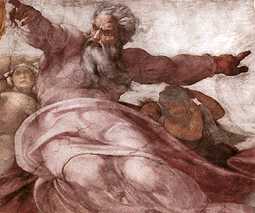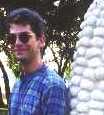NAVIGATION BAR






Monash Philosophy of Religion Links
From the Monash "Philosophy in Cyberspace" site. This features a number of sites devoted to philosophy of religion on the internet.Fides et Ratio
The recent encyclical from Pope John Paul II about the relationship between philosophy and religion.
Internet Ontological Argument Resources
What follows are some links to sites on the web dealing with the Ontological Argument, in its many formulations and incarnations.The Ontological Argument Here it is, in a few paragraphs, from St. Anselm.Kant's ObjectionHere is the relevant portion from the Critique of Pure Reason, where Kant lays out his objection to the argument. At the end of this selection is a brief discussion of the history of the argument in the 20th Century.Medieval Sourcebook: Philosophers' Criticisms of Anselm's Ontological Argument for the Being of GodSnippets of texts from such folks as Descartes, Leibniz, Kant, Spinoza, and Hegel addressing the Ontological Argument. Also links to Anselm's works and Gaunilo's objection.Objections to St. Anslem's Ontological ArgumentFrom the site of Prof. Manfredi at Southern Illinois University, Carbondale. A nice reconstruction and discussion of Gaunilo's, Kant's and other objections to Anselm as well as replies on Anselm's behalf.Kurt Godel's Ontological ArgumentA really cool and sophisticated site. Aside from the neat pictures, there is a nice discussion of modal logic, and though the discussion gets a bit formal at times, it is worth working through. It presents Anselm's argument as well as the version found in the writings of mathematician Kurt Godel. (There should be an umlaut over the 'o' in 'Godel', but I can't make that happen.)Deism Home PageThe home page for "Deism" (a particular view about the nature of God--I'll let you go and read about it), which features discussions of the various versions of the ontological argument, as well as a longish dialogue between a deist and an atheist about the merits of the argument.The Ontological Argument: an assessmentThis brief discussion includes a reconstruction of Charles Hartshorne's modal version of the argument. There are also some links to other discussions, as well as a brief bibliography.Discussion and Reconstruction of the Ontological ArgumentClass notes from Wes Morriston at the University of Colorado. A reconstruction of the traditional and modal versions of the argument. (The above link takes to you the first of 3 pages. To get to the others click here and then here)"Ontological Arguments" entry from the Stanford Encyclopedia of PhilosophyAn excellent overview written by Graham Oppy, a "player" in the current literature on the subject. This article features an excellent and up-to-date bibliography.
Internet Cosmological Argument Resources
What was done for the Ontological Argument, is now done for the Cosmological Argument, though, as with the above list, you shouldn't take the following as exhaustive. There's more on the net than is dreamt of in your philosophy, Horatio.Aquinas' Five Ways (From Summa Theologica) The classic statement of the cosmological argument.Taylor's Cosmological ArgumentNotes by Wes Morriston, from the University of ColoradoNotes on the Kalam Cosmological ArgumentVery good discussion by Wes Morriston, from the University of ColoradoMust the Beginning of the Universe Have a Personal Cause?"A Critical Evaluation of the Kalam Argument by Wes Morriston, Department of Philosophy, University of Colorado, Boulder." This is a journal-length paper by Prof. Morriston.Aquinas and the Big BangAn article from "First Things" by William Carroll on the Big Bang, Aquinas' account of creation, and the relationship between science and religion.
Additional Material on Arguments for God's Existence The Indispensability of Theological Meta-ethical Foundations for Morality A recent paper by William L. Craig defending the thesis that morality is impossible without God. Here's a paragraph from his paper setting out his thesis:Moral Arguments for Theistic Belief"Today I want to argue that if God exists, then the objectivity of moral values, moral duties, and moral accountability is secured,
but that in the absence of God, that is, if God does not exist, then morality is just a human convention, that is to say, morality is
wholly subjective and non-binding. We might act in precisely the same ways that we do in fact act, but in the absence of God,
such actions would no longer count as good (or evil), since if God does not exist, objective moral values do not exist. Thus, we
cannot truly be good without God. On the other hand, if we do believe that moral values and duties are objective, that provides
moral grounds for believing in God."A selection from a paper by Robert M. Adams offering up a version of the moral argument for God's existence. Here's an excerpt from his paper setting out the argument on which he focuses his attention:A debate between an atheist and a theist"We believe quite firmly that certain things are morally right and others are morally wrong (for example, that it is wrong to torture another person to death just for fun). Questions may be raised about the nature of that which is believed in these beliefs: what does the rightness or wrongness of an act consist in? I believe that the most adequate answer is provided by a theory that entails the
existence of God-specifically, by the theory that moral rightness and wrongness consist in agreement and disagreement, respectively, with the will or commands of a loving God. One of the most generally accepted reasons for believing in the existence of anything is that its existence is implied by the theory that seems to account most adequately for some subject matter. I take it, therefore, that my metaethical views provide me with a reason of some weight for believing in the existence of God."(From the introduction to this site:)The 2001 Principle
"In November of 1994 Dr. Michael Tooley and Dr. William Lane Craig debated
on the campus of the University of Colorado at Boulder. At the invitation of
Campus Crusade for Christ, these scholars discussed the evidence for and
against the existence of God, presenting some of the most current thinking on
the issues. The speakers followed a diverse range of materials, from the most
recent scientific findings and theories to the most ancient philosophical
arguments to some of the most novel insights imaginable."This is a web site devoted to a presentation of the Argument from Design. It uses the story of the classic sci-fi movie "2001: A Space Odyssey" to set out that argument.A Designer Universe?A lecture by Steven Weinberg discussing the question of whether there is evidence that the universe was designed. In the October 21, 1999 issue of the New York Review of Books"Least Action Hero" by Jim HoltA brief discussion of teleology in nature, providing some reason to think that the universe was designed by a purposeful agent. From Lingua Franca.
Freeman J. Dyson: Is God in the Lab?
Internet Problem of Evil Resources Notes on St. Augustine and Evil Class notes and discussion by Wes Morriston, from the University of ColoradoNotes on John Hick's TheodicyClass notes and discussion by Wes Morriston, from the University of ColoradoNotes on William Rowe's Argument against GodClass notes and a discussion of Rowe's theodicy by Wes Morriston, from the University of Colorado
The Meaning of It All: Thoughts of a Citizen Scientist by Richard P. FeynmanWilliam Lane Craig
Belief in God in an Age of Science by John Polkinghorne
A prolific defender of theistic positions who engages the objections of his critics head on, a tour through Dr. Craig's publications could occupy a great deal of time. Here is a directory of some of his articles, and texts of his many campus debates on questions relating to the existence of God.Camus on Religion, Faith and Absurdity
An essay, "This Sickness Unto Life", by Jim Wood on Camus' view of religion and the meaninglessness of life. The author focuses on Camus' wonderful essay, "The Myth of Sisyphus". Published in The New Republic, 8 Nov. 1999Theodore Drange's Home Page
Prof. Theodor Drange teaches philosophy at West Virginia University, and his Home Page features the texts of a number of interesting articles and debates in the philosophy of religion.Religion is selfish, blinkered and immoral
An article from 1 July 2000 by British philosopher A.C. Grayling in the Independent. A strident criticism of religion, especially in its role as offering moral guidance.